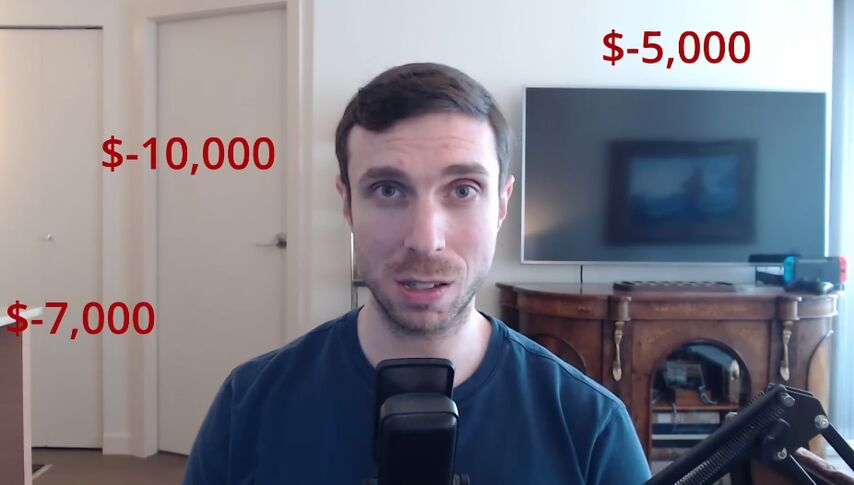Ilya Gorodetsky introduces Christopher "ceegee87" George:
The classic Las Vegas archetype is the perpetual underdog of the World Series. A station wagon that plays well in all games, but is either still not good enough, or just very unlucky. At the WSOP, Chris has 27 cashes (out of 29 recorded career cashes), 8 final tables, two top 3 finishes – and probably a decent gain for both him and his backers.
It's always great to discuss hands with these players or share your sorrows, the main thing is not to buy shares from them and not get carried away listening to stories with a bad ending. One or two – and you can say goodbye.
In this video, I want to talk about how my poker career began, and what difficulties I had to overcome in order to rise and take my current place in the poker hierarchy. I think we should all share our failure stories more often so that others can learn from our mistakes.
Today I will talk about how I once lost my bankroll and how it affected the trajectory of my poker career. It was 2011. More recently, I've finally begun to take poker seriously. I watched all the training videos, read all the books that seemed important for the growth of the skill, and played a lot. I was living at the house of a poker buddy at the time, but my goal was to win enough to move out and move to Las Vegas. At the time, everyone of any importance in poker lived in Vegas and played high stakes. At least that's how it seemed to me.
I played online for 8 hours a day, and spent the rest of the time studying. By January 2011, I had managed to build my bankroll from an initial $2,000 to around $40,000, after which I began to realize my dream.
I found a house rented by a group of young poker players who shared my aspirations, moved in with them, and turned pro. My goal from the very beginning was live poker, I perceived online only as a way of initial accumulation of capital, so the next step was to find the right game in the poker clubs of Vegas casinos. I found a great game at Wynn Casino where the $5/$10 and even $10/$20 stakes had a lot of recreational players. My expectation in such lineups looked very promising. I decided to start with $5/$10 and, armed with a modern strategy and understanding of the basics of bankroll management, I set about grinding. I played disciplined, attentively, I was doing well, and soon my bankroll grew to $80,000.
One fine day, a stranger sat down at the $5/$10 table. Wynn doesn't have a buy-in limit, and it's not uncommon for people to put tens of thousands of dollars on the table. This guy sat down with a deep stack – 40 thousand. He often entered pots even after 3-bets or 4-bets and constantly showed hands that I did not expect. I decided that I could punish him Phil Hellmuth style – lure him into a trap, take advantage of my ranges, honed by many years of practice online. A little patience and I'll take all his money.
After the first encounter with him, I lost my stack. I used to buy in for $2k at the table. Having bought more, I continued to play and after a while again played a big pot with this man. He again showed a hand he shouldn't have in this spot and I started to lose my temper. In order to quickly win back the loss, I did something that I usually didn’t do – I declared a stack deep enough to be able to recapture the entire loss in one hand – $8k.
As I said before, all my previous poker experience has been online. I knew the 100bb game well, 200bb max, but I was clearly not ready for deep stacks against a maniac.
On the next hand, he opened with a $30 raise from early position on a full table. I had two kings in the big blind. I 3-bet $120 and he immediately 4-bet $400. With an effective stack of $8k, I figured I could call.
The flop came . I checked. The villain bet the full pot, $805, and I check-raised to $2,400. He played a very wide range aggressively, so on this texture I was clearly ahead of him and I thought he was ready to stack with any overpair or even top pair.
He called. On the turn my stack was already less than the pot and we went all-in. He called and showed . 4-betting from early position with this hand took me by surprise!
I think you understand that my tilt peaked after this hand. I had no more chips, I had to go to the deposit box for the rebuy. I got there and wondered if I should return to the table. Fortunately, discipline prevailed and I decided to end the session.
Unfortunately, there are blackjack tables not far from the exit of the poker club in Wynn.

As soon as I saw them, I immediately remembered how, on my first visit to Vegas, I caught a wild streak in blackjack and won about $10k. I thought: this is it! Now I will recoup all my poker mistakes! I'll hit a blackjack, I'll break even, and everything will be as before.
I went back to the box, took another $6k, and sat down at a table with a minimum bet of $100 – quite an expensive game. This amount was enough for 15 or 20 minutes.
After losing $18,000 in a day, I admitted failure and returned home. I was very ashamed. I thought I would sleep the night and calm down, maybe relax somewhere with friends.

Alas, when I woke up the next morning, I still could not get rid of thoughts of my shame. That I made such a stupid mistake early in my poker career depressed me terribly, and I decided that I simply had to recoup as quickly as possible, maybe playing in a more variance style. For the next few weeks, I would wager $4k-$5k over my working limit to win one big pot to get me as close to my goal as possible. Instead of playing normally, I continued to try to bounce back after the first big setback. Nothing came of it.

And then I made an even crazier decision in terms of bankroll management – I moved up the limit, to $10/$20. It was like a fuse had blown in my head. There was no longer any logic in my decisions, only emotions remained.
Before that, I was an example of a disciplined professional with perfect bankroll management and good work discipline. Starting with $2k, I went 20x, moved to the city of my dreams, lived the perfect life, and enjoyed success. However, just one breakdown, one bad day completely destroyed my picture of the world. Overnight, I turned into a loser – and began to behave accordingly.
This story ended as expected – I lost everything. I went to an expensive game in the hope of winning back when it had long been out of the bankroll, and so I lost all my money. I only have about $4k left in my online account. So, time to get back to grinding online to build a new bankroll?
That April was crazy. As many of you have already realized, a few days later Black Friday happened and all my funds at Full Tilt Poker were frozen. So I went bankrupt.
I had nothing left but a Breitling watch, which I once bought, considering it an essential accessory for every self-respecting poker pro. I had to sell that to get at least some money. I got something like $2,700 and went to grind $2/$5 at Wynn.

So some terrible decisions brought me to the low point of my poker career. Getting back up was very difficult. My bankroll was really not enough for a live game, I had to look for backers who would put me in even at such low limits. In cooperation with the backer, I was gradually able to put together a new bankroll, but it took a very long time.
Losing $80k cost me much more than that amount, as it affected my entire professional career. I think if I had a single breakdown and calmly continued to grind $5/$10 in 100-200bb stacks, playing with discipline on a bankroll, I would naturally rise to $10/$20, or even higher pretty soon. But a series of bad decisions led to a snowball effect, I spent at least six months, or even a whole year, to return to the starting point from scratch. I was also lucky that useful contacts helped me get into an expensive game in which, playing from backers, I was able to win $70k. However, the new bankroll did not last long either, but I will tell you about how I lost it some other time.
